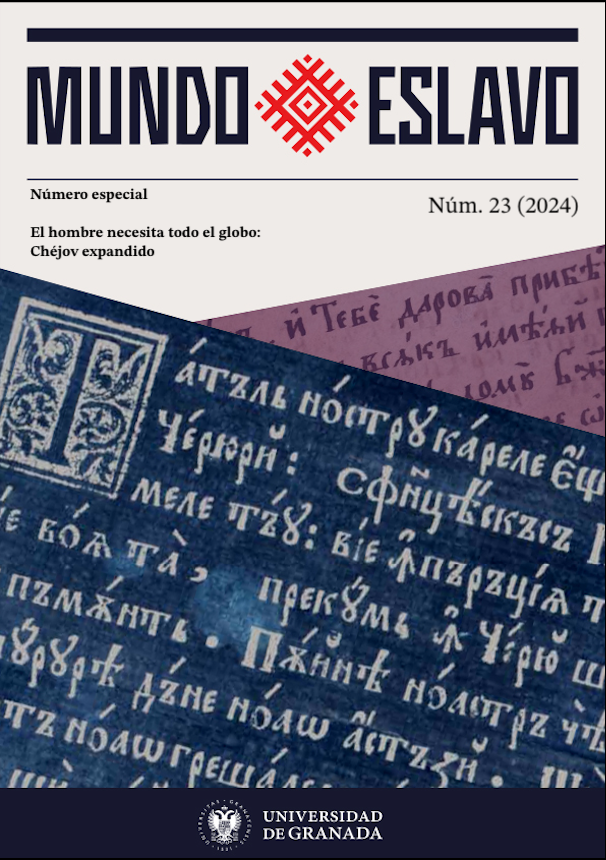Las secuelas de los cuentos de Chéjov: Una red de milagros
DOI:
https://doi.org/10.30827/meslav.23.31452Palabras clave:
Chéjov, Oates, Munro, Cheever, Carter, WeltyResumen
El artículo se centra en ciertas formas en que los cuentos de Chéjov han influido en las obras de individuos creativos posteriores. Hay una breve mención de rasgos de la poesía de Pablo Neruda, en su El Libro de las preguntas, que recuerdan rasgos de los cuentos de Chéjov. El artículo también menciona el "Cuarteto de cuerda n.º 13" de Dmitri Shostakovich, que, para el compositor, le recordó la historia de Chéjov "El monje Negro". Bob Dylan basó un álbum suyo en los cuentos de Chéjov. La mayor parte del artículo se concentra en las afinidades con Chéjov de una selección de cuentos de los escritores norteamericanos Joyce Carol Oates, Alice Munro, Raymond Carver, John Cheever y Eudora Welty. "La dama del perrito" de Joyc Carol Oates cambia la perspectiva del punto de vista de Gurov, en "La Dama del perrito", al de Anna. Alice Munro en "Walker Brothers Cowboy" muestra características similares a las de "Las bellas" de Chéjov. La obra "De qué Hablamos Cuando Hablamos de Amor" de Raymond Carver tiene conexiones con "Sobre el amor" de Chéjov, Eudora Welty, en "Un camino desgastado", como Chéjov, dota a sus personajes de dignidad, a pesar de sus defectos. Al igual que Chéjov, Welty no juzga a sus personajes. El artículo sugiere que "Los vientos" de Welty está en deuda con "La casa con el entrepiso" de Chéjov."Las historias de John Cheever, como las de Chéjov, muestran irresolución. Admirador del drama de Chéjov y de su prosa, Cheever, en su cuento "El día que el cerdo cayó al pozo", refleja temas de" El huerto de Cerezos", así como de las historias de Chéjov.
Descargas
Citas
Bartlett, R. (2000). Shostakovich and Chekhov. In R. Bartlett (Ed.), Shostakovich in Context (pp. 199-218). Oxford University Press.
Bellamy, J. D. (1972). The dark lady of American letters. An interview with Joyce Carol Oates. Atlantic Monthly, February, pp. 63-67.
Belluck, P. (2013, October 3). For better social skills, scientists recommend a little Chekhov. New York Times. https://archive.nytimes.com/well.blogs.nytimes.com/2013/10/03/i-know-how-youre-feeling-i-read-chekhov/
Carver, R. (1987). Errand. New Yorker, June 1, pp. 30-36.
Carver, R. (1992a). On errand. In W. L. Stull (Ed.), No heroics please. Uncollected writings of Raymond Carver (p. 145). Vintage Contemporaries.
Carver, R. (1992b). On errand. In W. L. Stull (Ed.), No heroics please. Uncollected writings of Raymond Carver (p. 146). Vintage Contemporaries.
Carver, R. (2009). What we talk about when we talk about love. In W. L. Stull and M. P. Carroll (Eds.). R.
Carver. Collected Stories (pp. 310-322). The Library of America.
Champion, L. (1997). What we talk about when we talk “about love”: Carver and Chekhov.Journal of the Short Story in English, Spring, 28, pp. 24-36.
Cheever, J. (2009a). A vision of the world. In Bailey, B. (Ed.), J. Cheever.Collected stories and other writings (pp. 615-621). The Library of America.
Cheever, J. (2009b). The day the pig fell into the well. In Bailey, B. (Ed.), J. Cheever.Collected stories and other writings (pp. 264-284). The Library of America.
Cheever, J. (2009c). The melancholy of distance. In Bailey, B. (Ed.), J. Cheever.Collected stories and other writings (pp. 984-992). The Library of America.
Chekhov, A.P. (1986). A lady’s story. In A. P. Chekhov, Theschoolmistress and other stories(pp. 87-95) (trans. C. Garnett). The Ecco Press.
Chekhov, A.P. (2014a). About love, Trans. C. Garnett. In A.P. Chekhov, Theschoolmistress and other stories (pp. 371-378) (trans. C. Garnett). The Ecco Press.
Chekhov, A.P. (2014b). The house with the mezzanine. In C. Popkin (Ed.). A.P. Chekhov. Selected stories (pp. 327-342) (trans. R. Meyer). Norton Critical Edition.
Chekhov, A.P. (2014c). The lady with the little dog. In C. Popkin (Ed.). A.P. Chekhov.Selected stories (pp. 414-427) (trans. R. Pevear and L. Volokhonsky). Norton Critical Edition.
Chekhov, A.P. (2014d). The student. In C. Popkin (Ed.). A.P. Chekhov. Selected stories (pp. 290-293) (trans. M. H. Heim.). Norton Critical Edition.
Chudakov, A. P. (1971). Poetika Chekhova. Nauka.Dylan, Bob. (2004). Chronicles. Volume one. Simon & Schuster.
Munro, A. (2017). 90 things to know about master short story writer Alice Munro. https://www.cbc.ca/books/90-things-to-know-about-master-short-story-writer-
Munro, A. (1997). Walker brothers cowboy. In A. Munro, A wilderness station. Selected stories 1968-1994 (pp.3-18). Vintage International.
Neruda, P. (2001a). Memoirs. Trans. H. St. Martin. Farrar, Straus and Giroux.
Neruda, P. (2001b). Tell me, is the rose naked. In Neruda, P. The book of questions. Trans. W. O’Daly. Copper Canyon Press.
Neruda, P. (2001c). Why do I hate cities. In Neruda, P. The book of questions. Trans. W. O’Daly. Copper Canyon Press.
Oates, J.C. (1972). The lady with the pet dog. In J. C. Oates, Marriages and infidelities (pp.392-411). Vanguard.
Welty, E. (1978). Reality in Chekhov’s stories. In E. Welty, The eye of the story. Selected essays and reviews (pp. 61-81). Vintage Books.
Welty, E. (1998a). A visit of charity. In E. Welty, Stories, essays, and memoir (pp.137-143). The Library of America.
Welty, E. (1998b). A worn path. In E. Welty, Stories, essays, and memoir (pp. 171-179). The Library of America.
Welty, E. (1998c). The winds. In E. Welty, Stories, essays, and memoir (pp. 252-267). The Library of America.
Descargas
Publicado
Cómo citar
Número
Sección
Licencia
Derechos de autor 2024 Mundo Eslavo

Esta obra está bajo una licencia internacional Creative Commons Atribución-NoComercial-CompartirIgual 4.0.
Los autores conservan los derechos de autor sobre sus trabajos y garantizan a la revista el derecho de ser la primera publicación del mismo. Los artículos se publican bajo la licencia Creative Commons Atribución-NoComercial 4.0 Internacional (CC BY-NC-SA 4.0), lo que permite a los lectores y otros investigadores copiar, redistribuir, remezclar, transformar y construir a partir del material, siempre que se respeten las condiciones establecidas.













